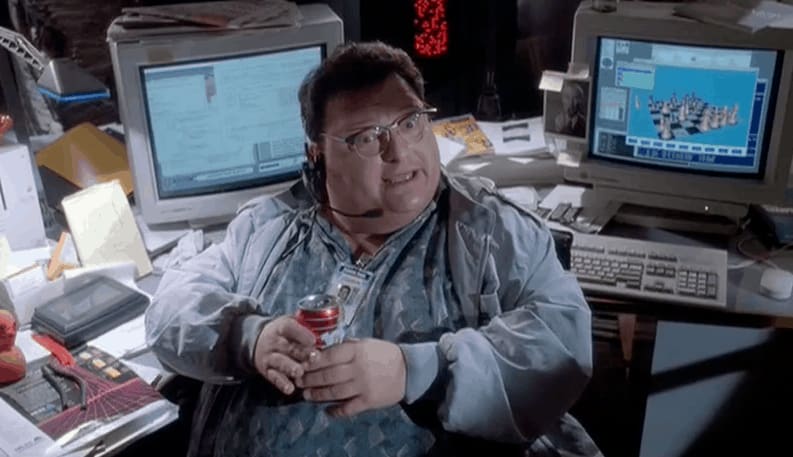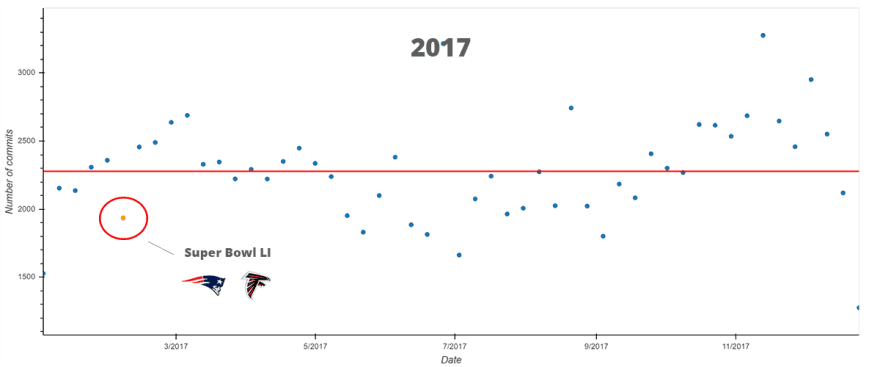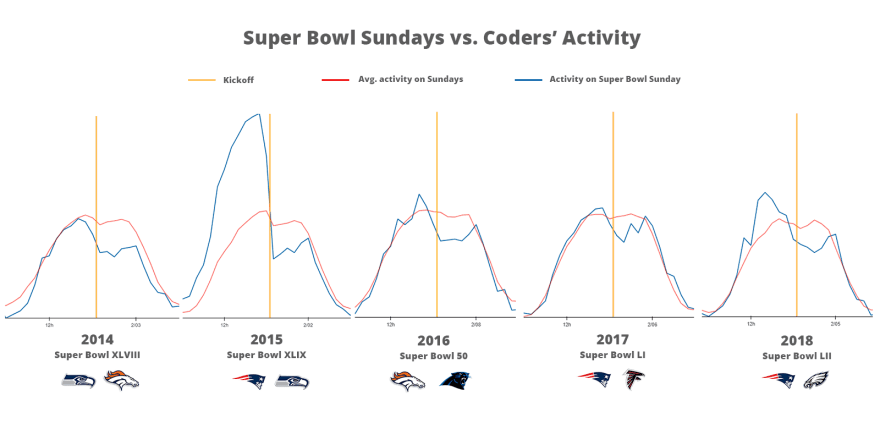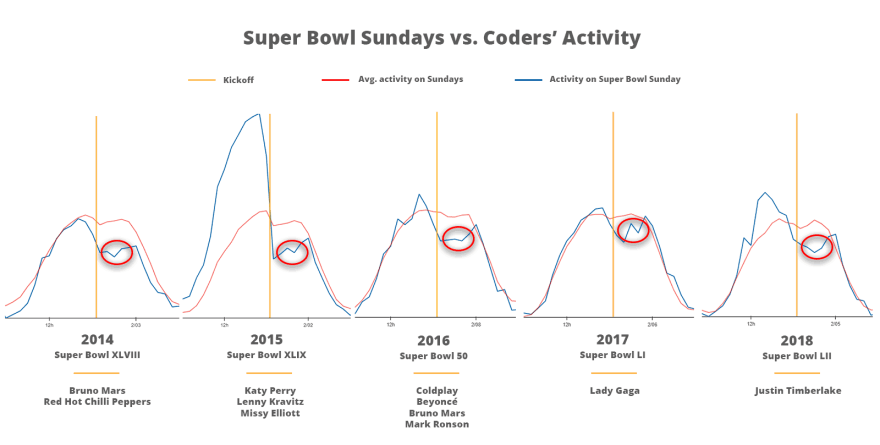We’ve all heard the stereotypes about software engineers. Don’t worry, I’m not going to start listing them. Let’s just say that when you ask someone to describe a developer, an image like this usually pops into their head:
Hmm… (f*ck) thanks, Hollywood.
Some of the stereotypes might be true. Others? Not so much. Today, we’re going to talk about one specific aspect: sports.
CODERS + SPORTS: Do they play them? Do they watch them?
It’s easier to measure coders’ sports watching behavior, so that’s what we’ll be focusing on in this article. We wanted to know whether broadcast sports events affect developers’ activity. Does productivity in most IT companies really grind to a halt when an important sports event starts? Do developers really stop committing, or is this just an urban legend?
To figure it out, we created a small “MythBusters Team” with our data scientist.
Background – Sporting Events
We selected football (the NFL, or National Football League) for our study. Here’s why we chose it:
1) Globally, most coding activities on major coding sites (like GitHub, StackOverflow, etc.) came from the United States.
While soccer, basketball, and cricket are famous worldwide, we wanted to concentrate on a major US sport.
2) The NFL is the most-watched sporting league in the US.
Although baseball may be “America’s pastime,” when we’re talking about television broadcast, the National Football League dominates. By a long shot. If we exclude Apollo 11’s moon landing and Richard Nixon’s resignation speech, it’s only Super Bowls in the top 10 all-time most-watched broadcast lists. WOW!
3) We’re coders, and we’re also NFL fans.
The 100th anniversary season just started, so we think it’s a great time to analyze how the NFL influences individual coders and even entire IT companies.
Background – Databases and Coders
To investigate coders’ behavior, we analyzed huge databases containing their work and activity. Some of these databases are public (e.g. open-source sites like GitHub) and some are private (CodersRank users’ private work). Here’s what we focused on:
Push events
To check coders’ activity and behavior, we chose push events. Push events happen when developers upload their commits to repositories – in other words, when they add the latest source code changes to a central file storage location.
2014 to 2018
Our research covers 5 full years of coders’ activity. We’re talking about 83,503,987 commits made by 371,140 different users. Because we wanted to compare the entire year’s activities, the 2019 Super Bowl isn’t included in our analysis.
Sundays
For each year, we compared Super Bowl Sunday to the rest of the Sundays of that year. The Super Bowl is always on the same day and starts at the same time, so it’s statistically easier to analyze the data and draw more reliable conclusions.
The Results
First, let’s check the number of commits on each Sunday during 2014, and the average daily commits for all Sundays combined.
Here, you can see the average number of commits made by users represented by the red line. We’ve marked Super Bowl Sunday with a yellow dot. Looking at the whole year, you’ll notice that activity on Super Bowl Sunday is way below average.
What about the next few years?
2015’s Super Bowl topped most-viewed broadcasts lists, and that Sunday also holds the record for lowest activity level among coders.
In 2016, Super Bowl Sunday was also one of the least-active Sundays.
But looking at 2017 and 2018, the numbers on Super Bowl Sunday are much closer to average. What happened? Did we coders lose our interest in football? Maybe we were sick of the New England Patriots, or didn’t like the performers scheduled for the halftime shows. Who knows?
Overall, we can see that Super Bowl Sundays have a clear effect on coders’ activity.
Now let’s dive in deeper. We wanted to be sure that these decreases were really caused by the Super Bowl, so we analyzed coders’ activity over each 24-hour period. You can see the results in the following chart, where we’ve put these 5 Super Bowl Sundays together. To account for the different time zones, we selected UTC-5, where the Super Bowl starts at 6:30 p.m
If you look at the gap between the red (average Sundays) and blue (Super Bowl Sundays) lines, you’ll see a few interesting things:
1) The Kickoff Effect
After the kickoff, the coders’ activity drops. Whether they’re glued to the TV or just indulging in wings and nachos, the Super Bowl has a clear effect on their activity. Here’s what else we notice:
- Before the kickoff, they work more.
- About an hour before the start, some of them stop working.
- After the game is over, everything goes back to normal.
Considering that we’re talking about Sunday afternoons and the drop is almost 20%, we can conclude: though developers may not be crazy NFL fans, they’re definitely influenced by the Super Bowl!
2) The Greatest Comeback in Football History
And they probably missed it. 🙁
In 2017, after the Falcons were leading 28-3 in the 3rd quarter (with an estimated 99.8% chance of winning) the Patriots shockingly clawed their way to victory. I think millions of people switched off their TVs, convinced that the game was “over.”
Comparing coders’ activity with other Super Bowls, it’s clear that they didn’t watch it till the end. It’s the first overtime that you can’t see on the graphs.
Even Lady Gaga couldn’t save this night.
3) Halftime Shows
We also analyzed activity during halftime shows, and came to the following conclusion.
It seems that coders tuned in to see Bruno Mars and Justin Timberlake, but Katy Perry and Lady Gaga weren’t so popular. Of course, this might have more to do with the game itself than the performers…
Conclusion
All in all, we can say with certainty that developers are influenced by the Super Bowl. Although life at IT companies doesn’t stop for the game, you probably shouldn’t expect too much from coders on NFL Sundays!
So what about you – are you a fan?
Please tell us what you think about this topic.











Top comments (0)